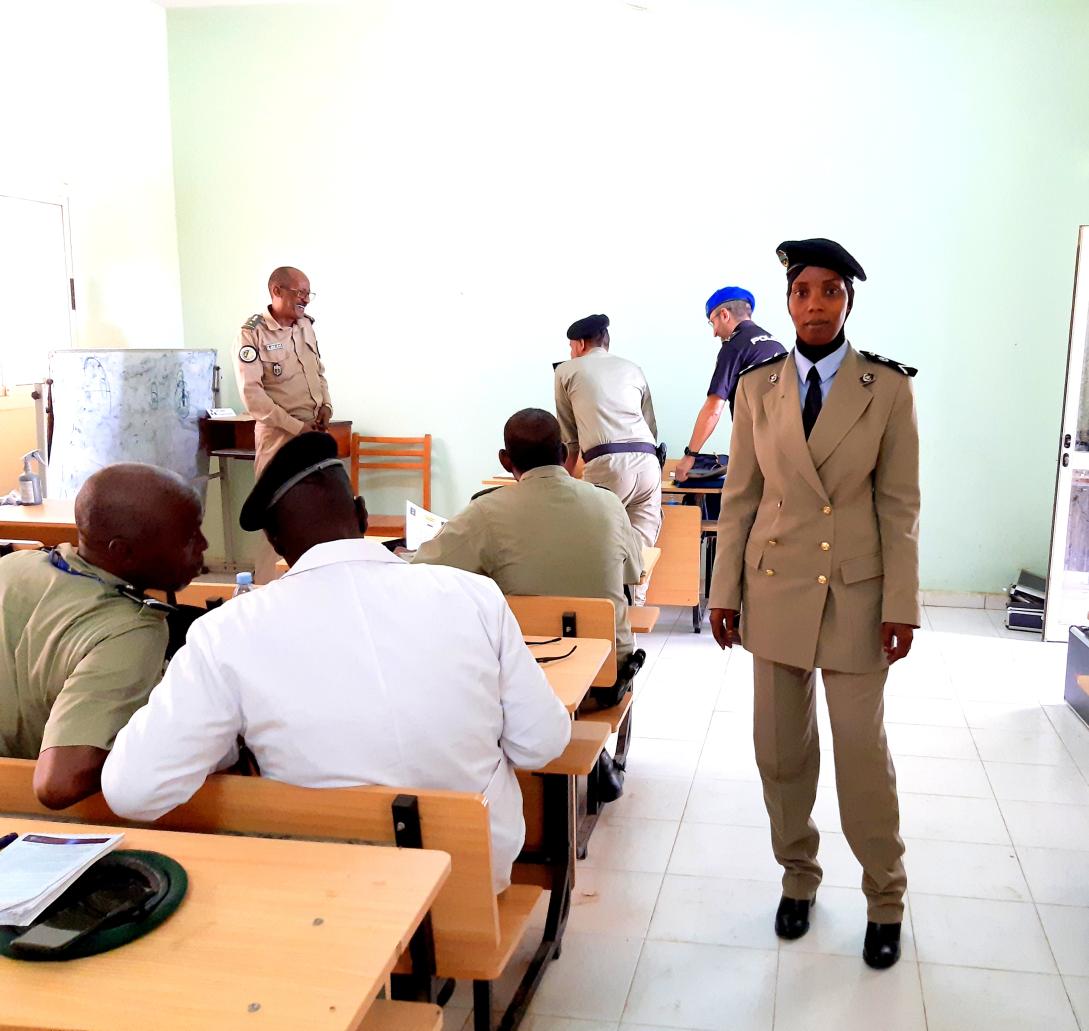The RACC contributes to Sahelian police-gendarmerie cooperation on Crime Scene Management

The course, organised by the EU Regional Advisory and Coordination Cell for the Sahel (RACC) in cooperation with EUCAP Sahel Mali, and the Mauritanian Police and Gendarmerie, took place in the Mauritanian capital Nouakchott on 1-12 August and included practical and theoretical sessions on “methodology of technical police investigation”, “practice of judiciary photography”, “research and collection of biological traces”, “what it can be used for an enquiry” and “how to collect evidence”.
“Traces have to be collected in a systematic, scientific and legal way” explains Sergio to his Mauritanian colleagues. During every class the Sahelian co-trainers share about their knowledge gained overtime in the region and abroad.
Fatimata, who is a Brigadier of the Police and a Crime Scene Technician (40 years old from Nouakchott), is the only woman participating in the course and has trained with the FBI in the United States, with Interpol in France (Lyon) and in Ivory Coast (where she has been six times). Subjects she is experienced in include Nuclear, Radiological, Biological and Chemical attacks.
The same goes for Zacharia Ali Ounn, 57, from the Mauritanian Gendarmerie, who has a long experience as trainer on crime scenes and other subjects, including anti-narcotics.
The atmosphere is collegial. Practical and theoretical lessons generate interaction and debates. The European trainer and the Mauritanian co-trainers share a lot of knowledge with their colleagues.
The five gendarmerie and six police officers attending the course ask questions to Sergio, Fatimata and Zacharia on the extent they can engage on a crime scene. “It is not our job to provide any assessment, we pass all we find on to other scientific police colleagues who will look into it.” Is the collective answer they receive.
Both Fatimata and Zacharia have previously benefited from trainings organised by the RACC, and both stress the importance of the common approach aspect of the training. They state that “it makes a lot of sense for gendarmes and police officer of the same country to be on the same pace.” Including gendarmes from different parts of the country, as done for this course is crucial, explains Zacharia, because the police mainly deal with crime scene situation in the capital.
“It can happen that a crime is committed in Nouakchott, but that complicit are in other part of the country and vice versa” details Zacharia, to underline the importance of the long-due approach of bringing together the different branches of the internal security forces. “Besides, the exchanges with European countries are vital for the enhancements of our capacities” adds Zacharia.
Fatimata agrees with him. She contributes to the discussion explaining about the importance of involving more women in the security sector. She says that recently two female engineers have been recruited in the scientific police, “but we need more”, underlines Fatimata, who is extremely passionate about her job. She is in fact also studying to obtain an engineering degree, as she wishes to further improve her knowledge and ability and to continue to be a role model for her Mauritania and Sahelian fellow female security officers. During the course there was no issue with the fact she is a woman teaching male colleagues, including with a higher rank. Everyone recognises Fatimata’s professionalism and experience, and all listen with attention when she speaks.
“As a woman I face many challenges in my work, but I am supported by my male colleagues” reveals Fatimata. “For a Muslim woman to touch a man by doing your job, or vice versa, can be problematic. This is one of the many reasons why it is important that women are in the ranks of our forces in a sufficient number to deal with other women when doing their job, as this can allow us to be more effective.”
In further detailing on the importance of including more women in the Sahelian security sector apparatus (one of the cross-cutting issues included in all RACC’s activities with their Sahelian counterparts) Fatimata says: “Women in the Sahel are rarely in a situation that allows them to prevent, manage or end conflicts. Yet it is important to include them in decision-making spheres because they are the main victims of insecurity, and they are fervent defenders of human rights and intrepid negotiators for peace. This is important also because many conflicts here are linked to violent extremism and ideologies that enslave women and girls. Women survivors of conflict can be employed in security and defence to deflect conflicts and even prevent them through their unfailing resilience”.
A convivial closing ceremony for the interactive course took place at the Nouakchott Police Academy on 12 august. EUCAP Sahel Mali and RACC’s experts delivered certificates to their fellow Sahelian security sector officers. Technical and scientific police equipment financed by the EUCAP Sahel Mali mission was handed over to representatives of the police and the gendarmerie.
“The professionalism of the Mauritanian technical and scientific police and gendarmerie experts is a guarantee for a brilliant future” said Sergo Sanvicente on the occasion. He left Mauritania with a Daraa in his luggage. The Mauritanian Traditional dress designed to protect against sun and as well as the sandstorms is a souvenir gifted to him by the engaged and focused trainees.





